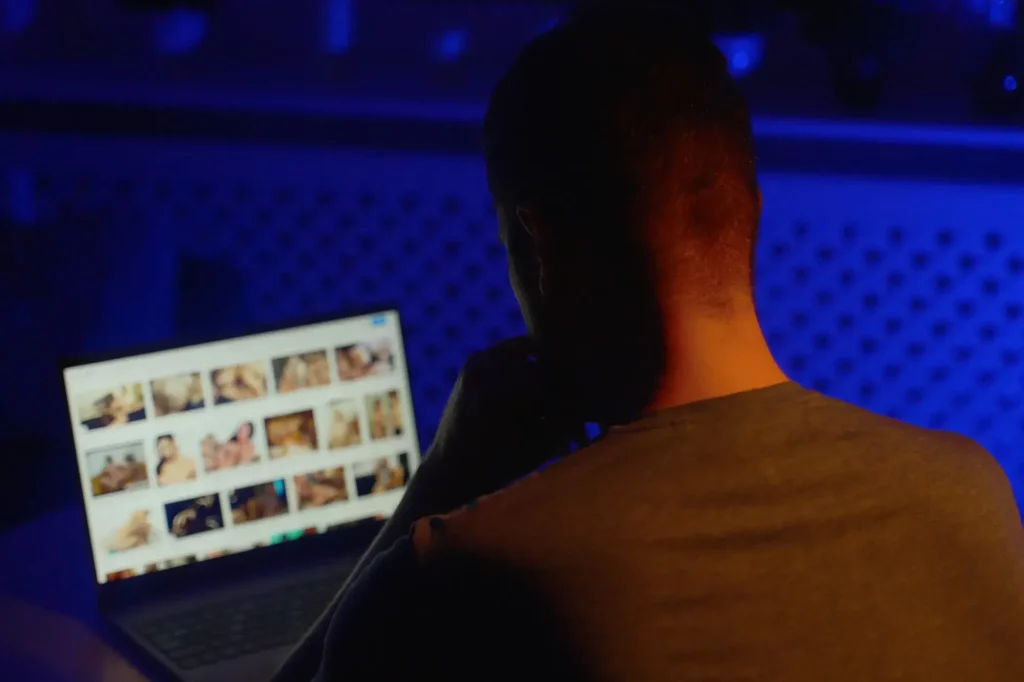In a world where everything is just a click away, it’s easy to lose track of boundaries. You might know someone or have wondered yourself: when does a simple click become a concerning habit? Porn addiction, a less talked about but prevalent concern, has impacted countless lives. But here’s the silver lining: recovery is not just possible; it’s achievable. In this blog, you’ll embark on a journey exploring the signs of porn addiction, understanding its broader implications, and most importantly, discovering the transformative power of therapy in charting the course to recovery. Dive in, as we shed light on reclaiming control and navigating towards a brighter, balanced tomorrow.
Contents
Understanding Porn Addiction
At the heart of any addiction lies an intense, often uncontrollable urge. But with porn addiction, there’s an added layer of mystery and misunderstanding. So, what exactly differentiates an occasional viewer from someone grappling with addiction?
Casual Consumption vs. Addiction: It’s not uncommon for adults to occasionally view explicit content, driven by curiosity or even as part of their intimate life. This is casual consumption. On the flip side, porn addiction manifests as a compulsive need. The viewer frequently returns to explicit content, not out of casual interest, but driven by a craving that seems almost insurmountable. It’s not about the content anymore; it’s about the rush it provides.
Over time, as consumption increases, the brain starts associating porn with a quick dopamine rush. This cycle – viewing, pleasure, craving, repeat – strengthens, making the pull towards porn stronger and more frequent. It can begin to serve as an escape mechanism from stress, loneliness, or other emotional states.
Recognizing the Signs of Porn Addiction

The journey from occasional viewing to addiction can be gradual, often slipping under the radar until it becomes a deep-seated habit. But like any addiction, there are telltale signs. Recognizing them early can be the key to timely intervention and recovery. So, what should one be on the lookout for?
Behavioral Signs:
- A noticeable increase in secretive behavior, such as quickly changing screens, deleting browsing history, or keeping late hours away from shared spaces, can be indicative.
- Spending prolonged hours viewing explicit content or an escalating need for more explicit or varied material to achieve the same level of excitement.
- Shunning responsibilities, missing deadlines, or showing decreased performance at work or school due to time spent on explicit content.
- Reduced interest in hobbies, social events, or activities once enjoyed, as they take a backseat to viewing.
Emotional Signs:
- Frequent irritability, anxiety, or emotional outbursts, especially if access to explicit content is denied or limited.
- An underlying sense of guilt after viewing, accompanied by self-promising to quit but failing to do so.
- Refusing to acknowledge the extent of the problem or downplaying the time spent on explicit content.
Physical Signs:
- A decreased interest in physical intimacy with a partner or requiring explicit content to become aroused.
- Staying up late or facing sleep disturbances due to extensive viewing or the associated stress.
- Disregarding personal hygiene, meals, or daily routines as the focus shifts predominantly to viewing.
Recognizing these signs is like connecting the dots. If several of them resonate, it might be time to consider the possibility of an addiction. But remember, acknowledging the problem is the first, brave step toward healing and recovery.
How Therapy Can Help Someone Who Is Addicted To Porn?

For those in the grip of addiction, the path ahead might seem uncertain, if not daunting. However, therapy stands as a beacon, illuminating the road to recovery and transformation form porn addiction. Here’s how therapy plays a pivotal role for someone navigating the challenges of porn addiction:
1. Safe Space for Expression: Therapy offers a judgment-free zone where individuals can openly discuss their struggles, fears, and aspirations. This space promotes self-reflection and a deeper understanding of one’s addiction.
2. Unearth Underlying Causes: Addictions often mask deeper emotional or psychological issues. Therapists help in identifying and addressing these root causes, be it trauma, past experiences, or underlying mental health challenges.
3. Cognitive Behavioral Techniques: This form of therapy is particularly effective for addiction. It aims to identify and rectify negative thought patterns and behaviors. By recognizing triggers and building healthier coping mechanisms, individuals can navigate cravings and reduce relapses.
4. Building Resilience: Therapy empowers individuals with tools and strategies to build resilience. This mental fortitude aids in combating temptations, setbacks, and helps in establishing a long-lasting recovery.
5. Restoring Relationships: Addiction can strain personal relationships. Therapists can mediate discussions, fostering understanding, and guiding both the individual and their loved ones towards mutual support and healing.
6. Accountability and Structure: Regular therapy sessions provide structure, aiding individuals in staying on track. Knowing there’s a scheduled check-in can motivate one to stay committed to their recovery journey.
7. Group Therapy and Peer Support: Interacting with peers who share similar challenges can be incredibly affirming. Group therapy sessions cultivate a sense of camaraderie, offering insights, shared experiences, and mutual encouragement.
8. Holistic Healing: Some therapeutic practices incorporate holistic approaches like mindfulness, meditation, or physical activities to complement traditional methods, ensuring a rounded path to well-being.
In essence, therapy isn’t just about tackling the addiction head-on. It’s about rediscovering oneself, mending fractured bonds, and crafting a future where one’s potential is fully realized, free from the shackles of addiction.
Seeking Help: First Steps Towards Recovery
Recognizing the need for help is a profound moment of clarity. If you or someone close is showing signs of addiction, remember: timely assistance is just around the corner. The path to healing often begins with a simple conversation. With platforms like TherapyMantra, expert guidance is merely a click away. Specialized therapists, dedicated helplines, and support groups stand ready to assist in your recovery journey. Don’t let distance or apprehension hold you back; reach out, and you’ll find a community eager to support and uplift you back to balance.
In Conclusion
Every journey has its challenges, but remember, you’re not alone. There’s strength in seeking assistance, in acknowledging the hurdles, and actively pursuing a brighter path forward. If you find yourself or someone you know entangled in the web of addiction, remember there’s always a way out. Online Therapy for porn addiction at TherapyMantra is here to guide you. Take the first step towards a renewed self: Book a trial Online therapy session today. Your tomorrow can be brighter than today, and we’re here to help you make that happen.


